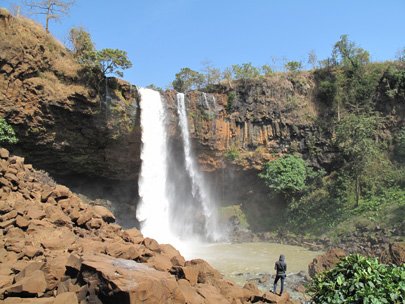We rode on a motorbike from the center of Pleiku City to make the short journey to Phu Cuong Waterfall, one of the destinations in Gia Lai Province.
 At a distance of 45 kilometers southeast of Pleiku city and three kilometers from Chu Se Town, Phu Cuong is considered as not only a grand and mighty waterfall but also a natural eco-tourism resort that makes a strong impression on both domestic and international tourists.
At a distance of 45 kilometers southeast of Pleiku city and three kilometers from Chu Se Town, Phu Cuong is considered as not only a grand and mighty waterfall but also a natural eco-tourism resort that makes a strong impression on both domestic and international tourists.
The sun on the day was not too hot and the road was not too rough. However, our keenness to see the wonder and the romantic scenery from along the road gave us more energy to conquer the road. The rubber trees' leaves were floating around, some red leaves remained on the branches and the light chill of January in the highlands made us feel cozy and at peace.
After two hours, we reached the fall with an entrance ticket priced at VND25,000 for two. All our fatigue was gone for now as we touched the waterfall rocks with our bare feet. The white foam flowed from a height of 45 meters like soft silk crossing the blue sky; and sometimes, tiny droplets in the wind rushed in and touched our face.
In this season, the water was not abundant but Phu Cuong Waterfall was still amazing with enough water for tourists to admire.
When midday arrived we had a chance to admire the most wonderful beauty of the fall when the sunlight shines on leaves, flowers, and especially the flow of water below that light up the fanciful rainbow. Moreover, the luxuriant and diversified vegetation, pure atmosphere together with the melody of water slipping through crevices of rocks and birds twittering were really special features of this land.
The highlight of the area is also thousands of yellow rocks with different shapes and species as colorful wild flowers grow in between the alternating wet stone in front of the fall where tourists can take a seat and enjoy a snack and a drink. Moreover, around the area are enormous trees where visitors can find some shade from the heat.
Phu Cuong waterfall flows on the lava base on an inactive volcano. In addition to a virtual sound of the falls, the water flows to La Peet stream and into the Ayun River - where the Ayun Ha irrigation with water reservoir area of approximately 3,700 hectares was built. Sitting on boats down the line of La Peet River and out to the Ayun River, tourists can go exploring the mountains and visit the villages of Ba Na and Gia Rai.
We left the fall with many pictures to admire when we come home never knowing if we will come back again, but at least now we know about its beauty and touched it cool water. To us, that was enough to make our trip to the highlands a perfect one.